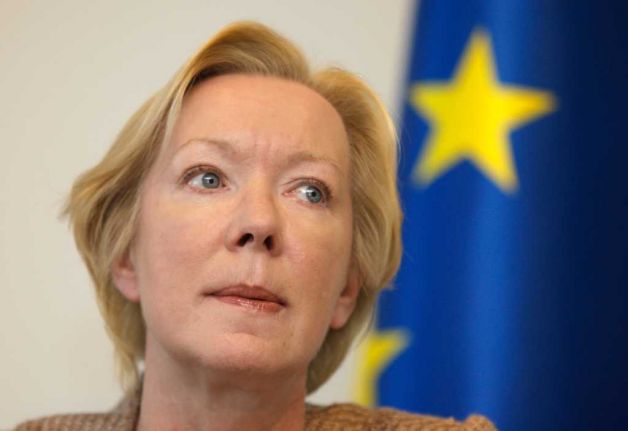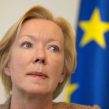
“And the Winner Is…”: Belarus and European Union Recall Each Other’s Ambassadors
Publication: Eurasia Daily Monitor Volume: 9 Issue: 43
By:

On February 29, Belarus and the European Union recalled each other’s ambassadors “for consultations,” amid a new round of EU-imposed sanctions against the government of Belarus. In a strategic sense, Brussels has lost control over the escalation process it had initiated one year ago by imposing sanctions against Minsk. The mutual recall of ambassadors deepens the gulf between the EU and its immediate neighbor in Central Europe. It is a gift of unexpected magnitude to Russian president-in-waiting Vladimir Putin’s Eurasian bloc-building strategy.
Since late 2011, the EU was considering additions to the already existing list of Belarus officials and businesses under sanctions. The EU’s East Europe-Central Asia Working Group (COEST, comprised of the 27 member countries and other EU authorities) spent several months poring over each name to be added to the year-old sanctions list, in minute detail. To observers with an insight into this process, and to many of the participants themselves, it was a purely bureaucratic exercise lacking strategic vision, and unconcerned with anticipating either the benefits or the costs of a new round of sanctions. EU officials privately acknowledge the ineffectiveness of sanctions on Belarus. Expanding the sanctions had turned from a policy instrument into a policy substitute.
On February 28, the Council of the EU (at foreign ministers’ level) approved a new round of sanctions. Twenty-one Belarus law-enforcement personnel (judges and interior ministry officials) were added to the already existing list of some 210 officials, blacklisted for participating in the December 2010 crackdown on post-election protests and the subsequent arrests and convictions. Most protesters have since been released from detention, and the remaining ones are eligible for presidential pardons. Yet, the EU speaks of a “deteriorating” situation. The sanctions include a ban on travel in EU territory and the freeze of bank accounts or assets possibly held in the EU by those sanctioned. Four companies “connected with the Belarus government” are earmarked for blacklisting during March (EU Observer, Belapan, https://Charter97.org, February 28 – March 1).
President Alyaksandr Lukashenka overreacted, almost predictably and certainly not for the first time. On the same day (February 28), the Belarus Ministry of Foreign Affairs (MFA) announced that Belarus would recall its ambassadors from Brussels and from Warsaw for consultations; and it “recommended” to the EU and Poland to recall these two mission chiefs from Minsk, also for consultations. On February 29, the head of the EU’s External Action Service (EEAS), Catherine Ashton, convened a meeting of the member states’ Political and Security Committee (PSC) which decided that all EU countries’ ambassadors be recalled from Minsk for consultations. This move had become almost inevitable for the EU to make in solidarity with the two ambassadors that Minsk had singled out for retaliation (Belapan, Interfax, February 29).
Thus, each side failed to anticipate the other’s riposte. Both sides are now caught in an escalation-and-counterescalation process that neither side fully controls, and neither actually wants to continue. Many European officials (including sanctions advocates) are well-aware that isolating Belarus could facilitate the country’s absorption by Russia, economically and politically. Alluding to that possibility, these European officials warn about Belarus’ “collapsing economy” and “self-isolation.” But they stop short of mentioning Russia as the third-partner winner from the EU-Belarus confrontation, and do not acknowledge that the isolation of Belarus is a two-way process.
According to Belarus MFA spokesman, Andrey Savinykh, Minsk reckons that the EU has two possible courses of action at its disposal from this point onward. One option is dialogue with the government of Belarus; the other option is mutual misunderstanding to continue for some time. Minsk “will strive to work on the first scenario” (Belapan, February 29).
Opposition groups in Belarus seem as divided on the sanctions issue as on most other issues. One group has enthusiastically thanked Lukashenka for overreacting in a way that isolates the government [though in fact, the country] from Europe (https://Charter97.org, February 29). On the other hand, Belarus Popular Front Party (BPFP) leaders Alyaksey Yanukevich and Vintsuk Vyachorka are cautioning the EU that the sanctions policy is merely reactive, lacking a strategy; and “the reduction of Europe’s diplomatic presence inevitably increases the role of imperialistic Russia on the territory of Belarus” (Belapan, February 29).
Some in the EU (including those voting unanimously for the blacklisting) recognize that risk more than others. According to Latvia’s deputy foreign minister Andris Teikmanis, for example, Latvia has opposed and will continue opposing economic sanctions, because these would hurt the population of Belarus; but Latvia might be unable to prevent the EU from imposing sanctions (LETA, March 1).
The EU’s mission chief in Belarus is a Latvian diplomat, Maira Mora. The Belarus MFA shot itself in the foot by sending her back “for consultations.” Conversely, the EU is hurting its own interests (of which some member countries are more aware than others) by reducing its presence in Belarus. The EU (like the US) is cutting itself off from information and contacts with the real decision-makers in the country. The timing is highly counterproductive, on the eve of a massive round of privatization of state property in Belarus.
In a more nuanced position, the EU’s Enlargement Commissioner, Stefan Fuele (a Czech diplomat) suggests a way forward from this situation. Fuele indirectly urges de-escalation on both sides in a sequence: first, the release and rehabilitation of remaining protesters from detention; then, re-engaging with Belarus for the benefit of its population. “Whatever is taking us away from the[se] most important tasks is unhelpful and counterproductive” (RFE/RL, February 28).
Unless the situation de-escalates, the Kremlin will be the winner in Belarus.




